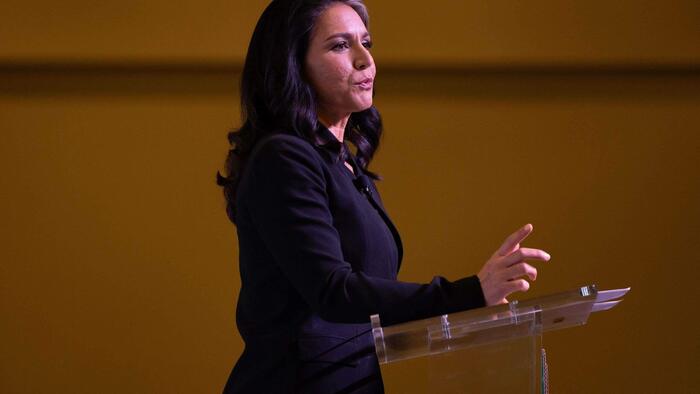Tulsi Gabbard’s recent return to Capitol Hill marks a significant chapter in her political journey, beginning with a friendly breakfast hosted by Iowa Senator Joni Ernst and meetings with various Republican senators. The appointments revolved around her nomination by President-elect Donald Trump to lead the U.S. intelligence community. Despite the warm reception from Republicans, Gabbard faced a frigid response from her former Democratic colleagues, particularly within the Senate Intelligence Committee, where she has struggled to secure meetings with Democrats. Reports indicate that outgoing Chairman Mark Warner has not responded to her requests, and even when meetings were tentatively scheduled, cancellations ensued. This development reflects the long-lasting repercussions of her departure from the Democratic Party, which she labeled an “elitist cabal of warmongers” when she left two years prior.
Gabbard’s political history, particularly her controversial meetings with Syrian President Bashar al-Assad during a 2017 visit, looms large over her current nomination process. Critics from both the Republican and Democratic sides question her foreign policy views and past actions. Notably, in 2020, during her presidential campaign, Gabbard faced intense scrutiny regarding her meetings with Assad, especially from prominent figures like Hillary Clinton, who accused her of being a “Russian asset.” While Democrats raise concerns regarding her security clearance, Republicans highlight her status as a lieutenant colonel in the U.S. Army Reserves, asserting that she is more than qualified to serve. Gabbard has maintained that Syria does not pose a direct threat to the United States, a stance that has alienated her from elements within the Democratic Party while resonating with a growing segment of the Republican base.
Despite the challenges and resistance she faces from Democrats, Gabbard finds solid support among Republicans. The GOP has shifted in recent years, with emerging skepticism of traditional foreign policy approaches gaining traction among its members. Prominent figures within the party, including Senators Rand Paul and Lindsey Graham, have publicly endorsed Gabbard, viewing her as a candidate aligned with the “America First” ideology that has gained prominent standing within the GOP. Trump’s nonchalant attitude towards Gabbard’s past conduct illustrates a broader shift towards embracing her as a valuable ally rather than a liability, indicating a possible unification of differing factions within the party.
As Gabbard navigates her nomination process, her commitment to ending foreign wars and prioritizing national security aligns closely with Trump’s policies. During her interactions on Capitol Hill, she reiterated her support for Trump’s leadership and his approach to international conflicts. Citing her military background, Gabbard emphasized her understanding of the consequences of war and the need for a resolute and clear national security strategy. This messaging positions her as an appealing candidate for the intelligence director role, which holds considerable influence over national security matters and intelligence operations.
The dynamic surrounding Gabbard’s nomination also highlights the potential political realignment that Trump’s presidency represents, particularly with disaffected Democrats. Many voters who once aligned with the Democratic Party, including Gabbard, now find themselves resonating more with the GOP’s current trajectory, which emphasizes nationalism and skepticism of foreign interventions. Pollster John McLaughlin suggests that Gabbard’s appointment could solidify this shift and help retain valuable new constituents for the Republican Party moving forward.
In conclusion, Gabbard’s nomination as director of national intelligence highlights the distinct factional divides within American politics. While she faces barriers in the Senate from her former party, her alignment with GOP ideals, particularly regarding foreign policy, could serve to fortify her position and foster a broader conversation about party identity. As both parties grapple with their futures, Gabbard stands at the intersection of these evolving narratives, embodying the complexities of modern political alignment in an era of stark polarization. Her ability, or inability, to garner bipartisan support will likely echo through future elections and the ongoing discourse around America’s role on the global stage.

